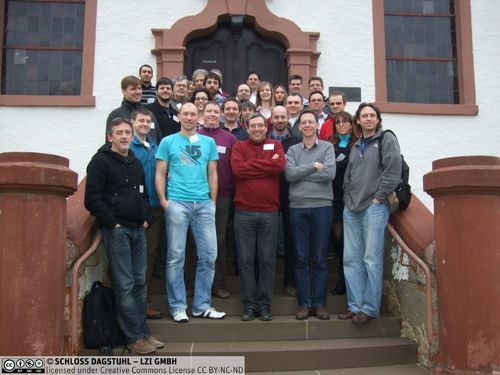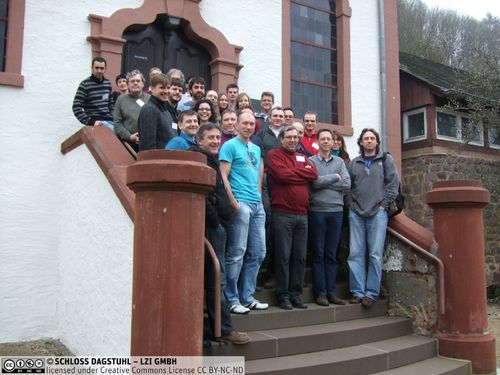Dagstuhl-Seminar 13021
Symbolic Methods in Testing
( 06. Jan – 11. Jan, 2013 )
Permalink
Organisatoren
- Thierry Jéron (INRIA Rennes - Bretagne Atlantique, FR)
- Margus Veanes (Microsoft Corporation - Redmond, US)
- Burkhart Wolff (University of Paris South XI, FR)
Kontakt
- Annette Beyer (für administrative Fragen)
Recent breakthroughs in deductive techniques such as satisfiability modulo theories (SMT), abstract interpretation, model-checking, and interactive theorem proving, have paved the way for new and practically effective techniques in the area of software testing and analysis. It is common to these techniques that statespaces, model-elements, program-fragments or automata are represented symbolically making systems amenable to analysis that have formerly been out of reach. Several research communities apply similar techniques to attack the classical problem of state space explosion by using symbolic representation and symbolic execution: parametrized unit testing, fuzz testing, model-based testing, theoremprover based test case generation techniques, and real-time system testing. Moreover, several areas where symbolic methods are used in testing, are often considered more closely related to verification and end up in conferences specialized on those topics rather than at testing conferences. There is little synergy between the different communities although many of them use similar underlying symbolic techniques.
In the following areas, symbolic analysis techniques have recently had significant impact, both industrially as well as in academia. The following areas capture some topics of interest for the proposed seminar, assuming focus on the use of symbolic techniques in each area: Unit Testing, Symbolic Automata Theory in Testing, Model Based Testing, Fuzz Testing, Security Testing, Real-time System Testing, Theorem-Prover-based Test-Case Generation, Hybrid System Testing, and Mutation Testing.
Recent breakthroughs in deductive techniques such as satisfiability modulo theories (SMT), abstract interpretation, model-checking, and interactive theorem proving, have paved the way for new and practically effective techniques in the area of software testing and analysis. It is common to these techniques that statespaces, model-elements, program-fragments or automata are represented symbolically making systems amenable to analysis that have formerly been out of reach. Several research communities apply similar techniques to attack the classical problem of state space explosion by using symbolic representation and symbolic execution: parametrized unit testing, fuzz testing, model-based testing, theoremprover based test case generation techniques, and real-time system testing. Moreover, several areas where symbolic methods are used in testing, are often considered more closely related to verification and end up in conferences specialized on those topics rather than at testing conferences. There is little synergy between the different communities although many of them use similar underlying symbolic techniques.
In the following areas, symbolic analysis techniques have recently had significant impact, both industrially as well as in academia. The following areas capture some topics of interest for the proposed seminar, assuming focus on the use of symbolic techniques in each area: Unit Testing, Symbolic Automata Theory in Testing, Model Based Testing, Fuzz Testing, Security Testing, Real-time System Testing, Theorem-Prover-based Test-Case Generation, Hybrid System Testing, and Mutation Testing.
 Thierry Jéron and Margus Veanes and Burkhart Wolff
Thierry Jéron and Margus Veanes and Burkhart Wolff
- Sébastien Bardin (CEA - Gif sur Yvette, FR) [dblp]
- Axel Belinfante (University of Twente, NL) [dblp]
- Nikolaj S. Bjørner (Microsoft Corporation - Redmond, US) [dblp]
- Jasmin Christian Blanchette (TU München, DE) [dblp]
- Achim D. Brucker (University of Karlskrona Ronneby, SE) [dblp]
- Lukas A. Brügger (ETH Zürich, CH) [dblp]
- Cristian Cadar (Imperial College London, GB) [dblp]
- Maria Christakis (ETH Zürich, CH) [dblp]
- Sylvain Conchon (University of Paris South XI, FR) [dblp]
- Wilkerson de Lucena Andrade (Universidade Federal - Campina Grande, BR) [dblp]
- Catherine Dubois (ENSIIE - Evry, FR) [dblp]
- Juhan Ernits (Tallinn University of Technology, EE) [dblp]
- Abderrahmane Feliachi (University of Paris South XI, FR) [dblp]
- Christophe Gaston (CEA - Gif sur Yvette, FR) [dblp]
- Arnaud Gotlieb (Simula Research Laboratory - Lysaker, NO) [dblp]
- Wolfgang Grieskamp (Google - Sammamish, US) [dblp]
- Robert M. Hierons (Brunel University, GB) [dblp]
- Thierry Jéron (INRIA Rennes - Bretagne Atlantique, FR) [dblp]
- René Just (University of Washington - Seattle, US) [dblp]
- Marko Kääramees (Tallinn University of Technology, EE) [dblp]
- Pascale Le Gall (Ecole Centrale Paris, FR) [dblp]
- Martin Leucker (Universität Lübeck, DE) [dblp]
- Delphine Longuet (University of Paris South XI, FR) [dblp]
- Dominique Méry (LORIA - Nancy, FR) [dblp]
- David Molnar (Microsoft Corporation - Redmond, US) [dblp]
- Brian Nielsen (Aalborg University, DK) [dblp]
- Grgur Petric Maretic (ETH Zürich, CH) [dblp]
- Frank Rogin (Biotronik - Berlin, DE) [dblp]
- Michel Rueher (University of Nice, FR) [dblp]
- Nikolai Tillmann (Microsoft Corporation - Redmond, US) [dblp]
- Jan Tretmans (Embedded Systems Institute - Eindhoven, NL) [dblp]
- Jaco van de Pol (University of Twente, NL) [dblp]
- Margus Veanes (Microsoft Corporation - Redmond, US) [dblp]
- Luca Vigano (University of Verona, IT) [dblp]
- Sabrina von Styp (RWTH Aachen, DE) [dblp]
- Helene Waeselynck (LAAS - Toulouse, FR) [dblp]
- Burkhart Wolff (University of Paris South XI, FR) [dblp]
- Fatiha Zaidi (University of Paris South XI, FR) [dblp]
Klassifikation
- Semantics and Formal Methods
- Verification and Validation
- Static Program and System Analysis
Schlagworte
- Automated Deduction
- White-box testing
- Black-box Testing
- Fuzz-Testing
- Unit-Testing
- Theorem prover-based Testing



 Creative Commons BY 3.0 Unported license
Creative Commons BY 3.0 Unported license
